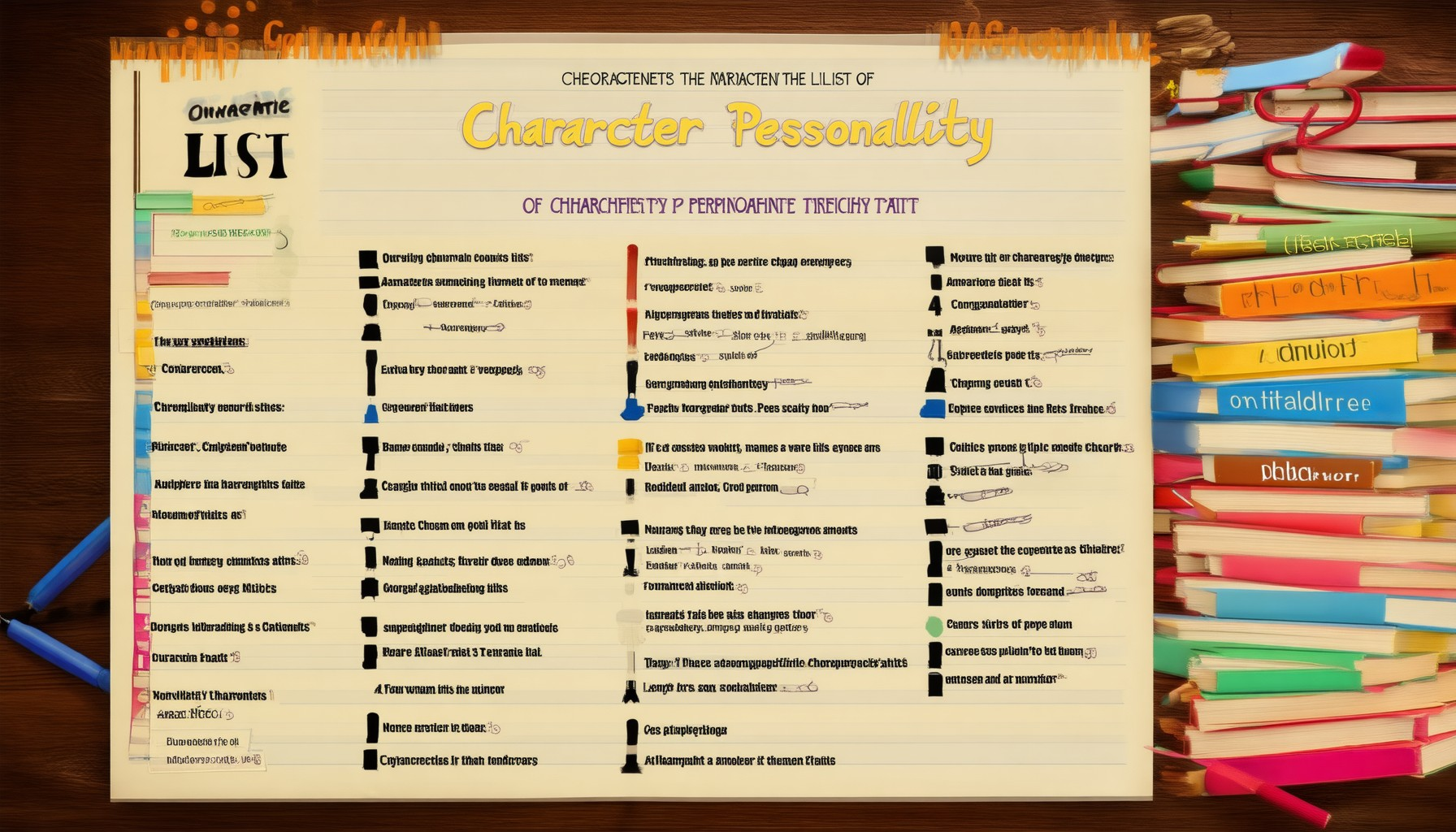Understanding the intricate details of character personality traits is a fascinating journey that delves into the complexities of human behavior. Whether you’re an aspiring writer, a psychology enthusiast, or someone looking to better understand oneself, exploring the vast landscape of character traits offers valuable insights. This comprehensive guide will walk you through the essential traits, both positive and negative, and their psychological underpinnings. By examining how these traits influence our actions and interactions, we aim to provide a clear framework for analyzing characters in literature, cinema, and even yourself. From identifying the five key traits to understanding the deeper psychological aspects, this article promises to shed light on the subject with precision and clarity. Join us as we uncover the nuances of character personality traits and how they shape our world.
Key Takeaways
- The Big Five personality traits—Extraversion, Agreeableness, Openness, Conscientiousness, and Neuroticism—provide a foundational model for understanding human behavior.
- Extraversion focuses on social energy and engagement, while Agreeableness emphasizes friendliness and cooperation.
- Openness drives curiosity and a love for exploration, whereas Conscientiousness ensures reliability and organization.
- Neuroticism highlights emotional sensitivity, though it can lead to stress management challenges.
- Beyond the Big Five, traits like Intelligence, Emotional Intelligence, Resilience, Creativity, and Leadership further define individual differences.
- The Five Cs of Character—Competence, Confidence, Connection, Character, and Caring—offer a holistic framework for personal growth.
- Understanding personality traits aids in self-awareness, fostering stronger relationships, and enhancing employability.

What Are the 100 Character Traits?
The concept of character traits involves a set of attributes that define an individual’s personality, behavior, and attitudes. Below is a categorized list of 100 character traits, organized into meaningful groups for easier comprehension:
- Intellectual Traits
- Creativity
- Inquisitive Mind
- Curiosity
- Problem-Solving Skills
- Logical Thinking
- Critical Thinking
- Analytical Skills
- Attention to Detail
- Memory
- Learning Ability
- Adaptability
- Open-Mindedness
- Independence
- Perseverance
- Dedication
- Goal Setting
- Time Management
- Self-Discipline
- Leadership
- Teamwork
- Communication Skills
- Empathy
- Altruism
- Enthusiasm
- Resilience
- Humility
- Gratitude
- Forgiveness
- Trustworthiness
- Honesty
- Integrity
- Loyalty
- Growth Mindset
- Continuous Learning
- Positive Attitude
- Flexibility
- Collaboration
- Conflict Resolution
- Delegation
- Decision-Making
- Adaptability
- Initiative
- Entrepreneurship
- Networking
- Leadership
- Networking
- Problem Solving
- Time Management
- Goal Setting
- Self-Awareness
- Emotional Intelligence
- Interpersonal Skills
- Active Listening
- Nonverbal Communication
- Verbal Communication
- Presentational Skills
- Written Communication
- Empathy
- Supportiveness
- Cooperation
- Team Spirit
- Persistence
- Commitment
- Responsibility
- Accountability
- Reliability
- Dependability
- Consistency
- Patience
- Kindness
- Friendliness
- Approachability
- Positivity
- Optimism
- Resilience
- Confidence
- Humility
- Modesty
- Generosity
- Charity
- Compassion
- Justice
- Fairness
- Equality
- Service-Oriented
- Motivation
- Drive
- Passion
- Commitment
- Discipline
- Tradition
- Family Values
- Community Spirit
- Cultural Awareness
- Global Perspective
- Educational Pursuits
- Lifelong Learning
- Adventure Seeking
- Risk-Taking
- Exploration
- Discovery
- Curiosity
- Creativity
- Innovation
- Progressive Thinking
- Challenging the Status Quo
- Leadership
- Networking
- Building Relationships
- Conflict Resolution
- Peace-Making
- Mediation
- Collaboration
- Teamwork
- Delegation
- Time Management
- Goal Setting
- Self-Discipline
- Perseverance
- Endurance
- Stamina
- Physical Health
- Mental Health
- Emotional Well-being
- Balance
- Work-Life Harmony
- Integrity
- Honesty
- Truthfulness
- Authenticity
- Transparency
- Accountability
- Responsibility
- Reliability
- Dependability
- Consistency
- Patience
- Kindness
- Friendliness
- Approachability
- Positivity
- Optimism
- Resilience
- Confidence
- Humility
- Modesty
- Generosity
- Charity
- Compassion
- Justice
- Fairness
- Equality
- Service-Oriented
- Motivation
- Drive
- Passion
- Commitment
- Discipline
- Tradition
- Family Values
- Community Spirit
- Cultural Awareness
- Global Perspective
- Educational Pursuits
- Lifelong Learning
- Adventure Seeking
- Risk-Taking
- Exploration
- Discovery
- Curiosity
- Creativity
- Innovation
- Progressive Thinking
- Challenging the Status Quo
- Leadership
- Networking
- Building Relationships
- Conflict Resolution
- Peace-Making
- Mediation
- Collaboration
- Teamwork
- Delegation
- Time Management
- Goal Setting
- Self-Discipline
- Perseverance
- Endurance
- Stamina
- Physical Health
- Mental Health
- Emotional Well-being
- Balance
- Work-Life Harmony
What Are 5 Good Personality Traits?
Here are five essential personality traits that contribute to personal growth, successful relationships, and overall happiness:
- Adaptability
Flexibility is key to thriving in life’s unpredictable nature. People with this trait embrace change, learn from mistakes, and adjust their strategies as needed. They are open-minded and willing to explore new perspectives, making them resilient in face of challenges. - Empathy
Empathy allows individuals to connect deeply with others, fostering stronger connections and reducing conflict. Those with this trait listen actively, understand others’ emotions, and offer support, creating a positive impact on their social circles. - Optimism
An optimistic outlook helps individuals see opportunities even in difficult situations. This trait boosts motivation, mental health, and overall life satisfaction, making it a powerful tool for overcoming obstacles. - Responsibility
Taking ownership of actions and commitments builds trust and credibility. Responsible individuals follow through on promises, meet deadlines, and hold themselves accountable, contributing to success in personal and professional settings. - Resilience
Resilience enables people to bounce back from failures and setbacks. This trait involves perseverance, problem-solving skills, and a positive mindset, allowing individuals to grow stronger after facing adversity.
These traits, when developed and nurtured, lead to a more fulfilling and meaningful life.

Understanding the 7 Basic Personality Traits
The study of personality traits has evolved significantly over time, leading to a deeper understanding of how individuals differ in their behavior, preferences, and approaches to life. Below, we explore the 7 fundamental personality traits that form the basis of most personality theories.
1. Extraversion vs. Introversion
- Extraversion : Individuals who are extraverts tend to be energetic, outgoing, and thrive in social settings. They often seek stimulation and enjoy interacting with others.
- Introversion : In contrast, introverts are typically more reserved, preferring solitude or small groups. They may find energy through introspection and prefer deep, meaningful conversations.
2. Openness to Experience
- Openness to experience refers to the extent to which an individual is open to new experiences, ideas, and feelings. Those high in openness are curious, creative, and adventurous, while those low in openness may prefer routine and tradition.
3. Conscientiousness
- Conscientiousness involves self-discipline, responsibility, and a sense of duty. High levels of conscientiousness lead to organization, reliability, and a strong ethical compass. Low levels may result in impulsivity and difficulty sticking to plans.
4. Neuroticism
- Neuroticism describes emotional volatility, anxiety, and tendency toward mood swings. Individuals high in neuroticism may struggle with stress and emotional regulation, while those low in neuroticism are more stable and composed.
5. Agreeableness
- Agreeableness reflects an individual’s tendency to be cooperative, empathetic, and trusting. High agreeableness often leads to positive relationships and teamwork, while low levels may result in conflict and mistrust.
6. Disagreeableness
- Disagreeableness is the opposite of agreeableness, encompassing competitiveness, assertiveness, and a focus on achieving goals. High disagreeableness can make individuals more dominant and less collaborative.
7. Personality Types
- Understanding these traits helps in categorizing personality types, such as the Myers-Briggs Type Indicator, which sorts individuals into 16 distinct personality types based on combinations of these traits.
By understanding these personality traits, individuals can gain insight into their own behavior and that of others, fostering better communication and relationships.

What Are the 5 Key Character Traits?
The five key character traits, often referred to as the “Big Five” personality traits, are a model used in psychology to describe human personality. These traits provide a framework for understanding individual differences in behavior, attitudes, and preferences. Below is an overview of each trait:
- Extraversion (Extroversion)
- Energy and enthusiasm in social interactions.
- Enjoyment of being around people and engaging in activities.
- Tend to seek stimulation and excitement.
- Agreeableness
- Friendliness and cooperativeness toward others.
- Empathy and ability to connect with others emotionally.
- Often exhibit trust and kindness.
- Openness
- Curiosity and interest in exploring new ideas and experiences.
- Creativity and willingness to take risks.
- Enjoys diversity and complexity in life.
- Conscientiousness
- Organization and responsibility in tasks.
- Attention to detail and reliability.
- Focused on achieving goals and maintaining integrity.
- Neuroticism
- Emotional sensitivity and tendency toward stress.
- Vulnerability to negative emotions like anxiety and depression.
- May struggle with self-regulation and impulse control.
These traits are widely studied and have significant implications in fields such as psychology, sociology, and education. Understanding these characteristics can help individuals better understand themselves and others, fostering improved communication and relationships.
What is a List of Personality Traits?
A list of personality traits refers to a collection of distinct characteristics that define an individual’s behavior, emotions, and ways of thinking. These traits are often studied in psychology and can influence how people interact, make decisions, and approach life. Below is a detailed overview of some common personality traits:
The Big Five Personality Traits
The most widely recognized model of personality traits is the Big Five, which includes five primary dimensions:
- Openness : Characterized by curiosity, creativity, and a love for exploration. Open individuals are often enthusiastic and eager to experience new things.
- Conscientiousness : Known for being reliable, responsible, and organized. Conscientious people tend to plan well and stick to their goals.
- Extraversion : Reflects energy and enthusiasm for social interactions. Extraverts enjoy being around people and are often the life of the party.
- Agreeableness : Involves warmth, empathy, and cooperation. Agreeable individuals are typically friendly and good at resolving conflicts.
- Neuroticism : Includes emotional volatility, anxiety, and stress sensitivity. Neurotic people may struggle with managing their emotions effectively.
Other Notable Personality Traits
Beyond the Big Five, there are many other personality traits that describe various aspects of human behavior:
- Intelligence : Refers to cognitive abilities like problem-solving, learning, and adaptability.
- Emotional Intelligence : Involves the ability to recognize and manage one’s own emotions as well as those of others.
- Resilience : The capacity to recover quickly from setbacks and adapt to change.
- Creativity : The ability to generate innovative ideas and think outside the box.
- Leadership : Traits like confidence, communication skills, and decision-making abilities are essential for effective leadership.
Why Understanding Personality Traits Matters
Understanding personality traits can be beneficial in various contexts, such as:
- Self-Development : Knowing your own traits can help you understand yourself better and work on personal growth.
- Relationships : Recognizing the traits of yourself and others can improve communication and conflict resolution.
- Employment : Employers often assess personality traits during hiring processes to gauge candidate fit for specific roles.
By exploring these traits, you can gain deeper insights into yourself and others, fostering more meaningful interactions and successful outcomes in everyday life.

The Five Cs of Character
The concept of character is often broken down into key components that define an individual’s personal qualities and strengths. While various theories have emerged over time, the five Cs of character remain a popular framework for understanding and developing these traits. Here’s a breakdown of each component:
- Competence : This refers to the ability to perform tasks effectively and efficiently. Competence involves having the knowledge, skills, and experience necessary to handle challenges and achieve goals. It’s about being reliable and capable in various situations.
- Confidence : Confidence is the belief in one’s abilities and capabilities. It’s the assurance that allows individuals to take on tasks and responsibilities with a sense of self-assurance. However, it’s important to distinguish between healthy confidence and arrogance.
- Connection : This pertains to the ability to connect with others emotionally and socially. Building strong relationships and fostering trust are key aspects of connection. It’s about understanding and empathizing with others, which helps in teamwork and collaboration.
- Character : Character is the set of values, principles, and traits that define a person’s moral and ethical standards. It encompasses integrity, honesty, and the ability to navigate complex situations with a sense of purpose and direction.
- Caring : Caring, or compassion, is the ability to empathize with and support others. It involves a deep concern for the well-being of others and a willingness to take action to help. Caring fosters a sense of community and mutual support.
These five Cs provide a comprehensive framework for understanding and developing the qualities that contribute to personal growth and success. By focusing on competence, confidence, connection, character, and caring, individuals can cultivate a well-rounded and resilient personality that thrives in various life circumstances.
To learn more about how these principles apply to personal development and leadership, visit our website and explore the resources available for writers and literary enthusiasts.





0 Comments